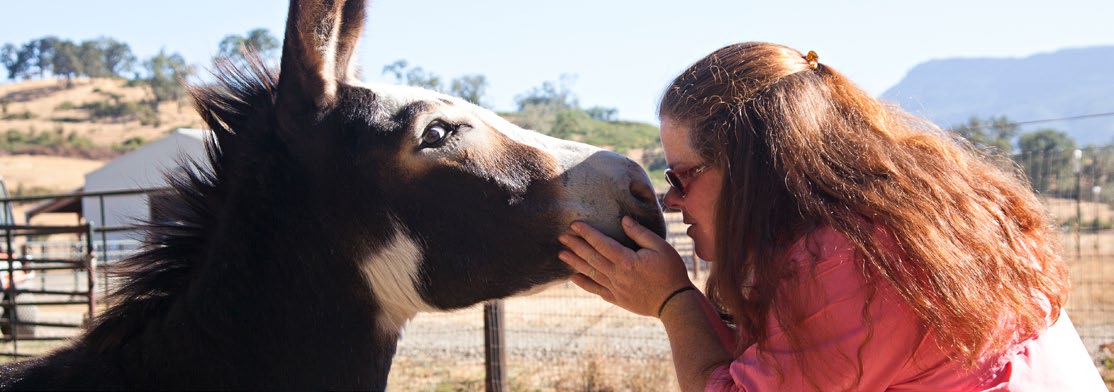Safe Haven for Horses

Duchess Sanctuary near Oakland is home to 196 animals, most rescued from abuse and neglect.
Story by Bentley Gilbert Photos by Tristin Godsey
From the gate of Duchess Sanctuary, in the hills east of Oakland, a visitor can look out at the lush pastures and fencing that cover much of the sanctuary’s 1,120 acres.
The acreage is home to a herd of 196 horses and donkeys rescued from abuse and neglect. Here they will live out their lives in a spacious natural environment with food and veterinary care.
Duchess Sanctuary is operated by nonprofit Fund for Animals in partnership with the Humane Society of the United States. It was made possible by a donation from the Ark Watch Foundation, which financed the purchase of the property, and continues to support operations.
Duchess Sanctuary director Jennifer Kunz.
Duchess is among the largest animal sanctuaries in North America. But it had to undergo improvement during the last decade to achieve the quiet, pastoral setting its equine population inhabits today.
The most visible of these is the miles of horse-safe fencing surrounding and bisecting the property. Workers had to remove more than 17 miles of barbed wire. In addition, a new water system was installed, roads built and upgraded, shelters erected in each of the pastures and enclosures, and a “Hospital Barn” built for treatment and care of horses with special needs.
Animals of varying condition comprise the herd. The “big” herd of about 100 is made up of larger horses, such as draft animals or mares rescued from the Pregnant Mare Urine industry, which collects mares’ urine for sale to makers of hormone replacement therapy and related drugs.
The “light” herd has about 40 animals from breeds including appaloosas, paints and quarter horses.
The remaining horses fall into the special needs category. This includes elderly animals, those requiring daily medication, those with arthritis and foot problems from standing too long on hard floors, others needing a special diet and the blind or partially-blind.
Besides the PMU rescues, the sanctuary is home to mustangs from wild herds on public lands, and horses and donkeys rescued from feedlots and slaughter or other neglectful or abusive situations.
Think of the photographs you may have seen of animals with toes curled up or standing alone, forlorn, unkempt and with their ribs visible from lack of food.
“THIS IS THE LAST HOME THESE ANIMALS ARE EVER GOING TO HAVE AND WE ARE DETERMINED TO MAKE IT THE BEST ONE.” —Jennifer Kunz
Workers at Duchess Sanctuary rehabilitate the animals and allow them to live out their days in safe, open spaces with room to run. The horses, in turn, seem relaxed and not alarmed by the presence of people or other horses.
“They know this is a safe place,” says Jennifer Kunz, Duchess Sanctuary’s director, who has been “horse crazy” for as long as she can remember. “We leave interaction up to the horse. It’s their choice how much contact they prefer. Some take much longer to realize that humans can be trusted.”
Taking care of rescued horses is what the Canadian has done from the time she studied equine science. She manages a staff of five and recruits and directs about 40 volunteers, who each year contribute hundreds of hours of labor.
Duchess Sanctuary hosts three open houses annually for the public to view the sanctuary’s work and, of course, the horses. The remaining 2018 open house is scheduled for Dec. 15. Another has been set for May 2019.
Apart from the open-house events and scheduled volunteer shifts, entrance to Duchess Sanctuary is by appointment only.
“Duchess Sanctuary exists first and foremost for the horses,” Kunz says. “It’s for their comfort.”
It’s also why the sanctuary, which is near its 200-horse capacity, must resist the temptation to take “one more horse.” Housing more animals than the staff, volunteers and land can accommodate would produce overcrowding and reduce the level of care.
Duchess Sanctuary does not allow its horses to be adopted. The oldest on the property are 30 years old. Almost 50 are older than 20. The average age is 17.
“This is the last home these animals are ever going to have and we are determined to make it the best one,” says Kunz.








